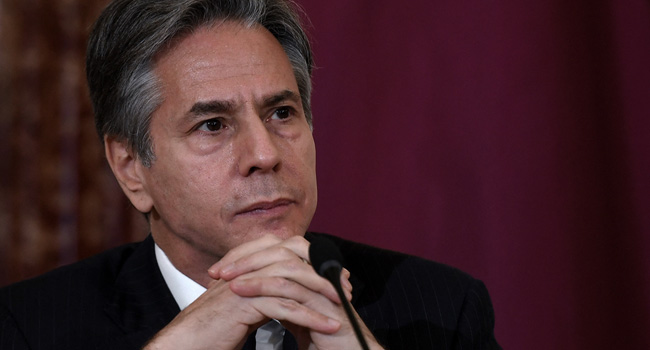
In a bid to bring the protracted Boko Haram conflict to a finite end, various approaches have been applied and a myriad of inferences abound, even as counterterrorist and counterinsurgent measures fail to yield desired results.
It’s been 12 years of terror, tens of thousands have lost their lives and millions have been displaced; never would one have thought that the nation will consider offering amnesty to the individuals who maimed, kidnapped, and killed innocent citizens, spreading dismay and fear, especially within the North East.
However, that option is now on the table. This approach has even become more pronounced following the massive surrender by Boko Haram fighters, recently.
The amnesty exercise for “Repentant Boko Haram Members” has had its dogged critics and its prominent advocates, including the Catholic Bishop of Sokoto Diocese, Matthew Kukah, and Senate President Ahmad Lawan who believe that the recent surrender of Boko Haram insurgents is a welcome development which should be encouraged.
Beyond the debate for and against the exercise, here are 11 questions that many Nigerians need answers to.
Do the people really want them back?
Knowing the magnitude of damage that these terrorists have caused Nigerians over the years, there are some who ask if “I am sorry” will be enough to bring the people consolation.
How genuine is their surrender?
For those who have asked this question, the matter is simple; how can we be sure that the recent surrendering that has been witnessed is genuine, knowing that the Boko Haram war is not just a physical conflict, but a battle of ideologies. How soon will they go back to their rebellion?
What are the downsides to handing out the olive branch?
While it would seem that the amnesty exercise gives the nation an extra chance at ending the insurgency in no distant time, some are concerned that we have not weighed the negatives that can come from pardoning these terrorists who have prosecuted this war for about 12 years.
For instance, if this is a subtle way to get back into communities, are we ready for the damage they can cause? Another damage envisaged includes lasting hostilities between the communities and the penitent terrorists.
Will they be trained abroad?
This question was expected, in that, the first major amnesty exercise in Nigeria was handed to the Niger Delta Militants and asides monies paid, there were programmes for a good number of militants to be trained abroad.
Perhaps the argument here is that the militants were said to be fighting for the destruction of their lands and the suffering of the region following oil explorations, while the Boko Haram’s war is purely against western education, an idea which many have described as barbaric at best.
So the question is will these fighters who have “no real course” be allowed to train abroad while those whose lives have been shattered by their deeds are left without schools?
Why is amnesty a priority at this time?
Senator Ali Ndume is perhaps the chief quizzer on this one.
In a recent interview, the lawmaker who serves as Chairman of the Senate Committee on Army was of the opinion that it is only when the war has been won that we can begin to think about those who come out to surrender.
According to him, handing the terrorists an olive branch at this time will only encourage others to join the sect. He said having the exercise at this time is, at best, a misplacement of priority.
What about the IDPs?
Indeed, millions have become internally displaced due to the Boko Haram war and there is a question in line with Senator Ndume’s viewpoint and that is “what becomes of the IDPs?”
As the nation begins to look critically into the rehabilitation of the ex-radicals, people are wondering if this development is not stalling the push to have displaced Nigerians returned to their homes.
There are those who are of the opinion that the IDPs must at this moment remain the major focus of the government, not those who have inflicted pain on the nation. For these persons, the most important and yet to be answered question remains “when are the IDPs going home?”
In what way will the repentant fighters be settled?
Surrendering is one thing, de-radicalising those who have surrendered is another. However, what will they do after they have been de-radicalised?
A common answer would be to go back to the farms or acquire a skill, but one understands that insurgency is a multi-million-dollar affair and many of these individuals have been used to a certain level of comfort and power that the farms and workshops may not avail them at this time.
This begs the question; will they stay patient or will they ask for more?
Will they be allowed to enjoy all their civil rights?
By this question, we mean, are there legislations in place or being formulated to back their incorporation back into society?
Are there laws that expressly explain the nation’s stand on such very delicate issues as the stigma they may face, the kinds of jobs they are entitled to or may not be entitled to, and the positions they may hold in society?
Should they serve some jail term or some other punishment?
Here, the law regarding how to deal with prisoners of war will come in handy, but this must not be left to the understanding of a certain class. There is a need for the people to be enlightened as to why these individuals are not in jail or why they have not been charged to court.
There are many who are wondering where the justice has been served if all of a sudden, their past deeds are not put into consideration and the individuals made to face the law, even if it means that their sentences would be drastically shortened.
It is left for the authorities to enlighten the people further as regards punitive measures and the amnesty exercise.
Can they join the military?
Yes, this question would seem to have been linked with 8 above. However, the jobs talked about in the former, are not the same as getting into the military, for to be a part of the force is more than just a job.
This rather sensitive subject has stirred very heated debates severally; however, at each time the Defence Headquarters has always made it clear that there will be no absorption of deradicalised Boko Haram ex-fighters into the Nigerian military.
According to the Force, Nigeria has enough able-bodied men who are willing to serve their fatherland, and as such grafting repentant Boko Haram members is not an option.
Have they been yielding quality information?
For some Nigerians, one of the only bases upon which amnesty will be granted to any Boko Haram member should be based on the quality of information supplied.
It is expected in some quarters of the country that the fighters who are surrendering at the moment, are giving the authorities very vital information that will see the army do major damages to any Boko Haram/ISWAP strongholds that still exists today.
This way there could be a case made for them as regards helping the nation to quash the insurgency for good, maybe when this is done, then a course is charted for redemption.




